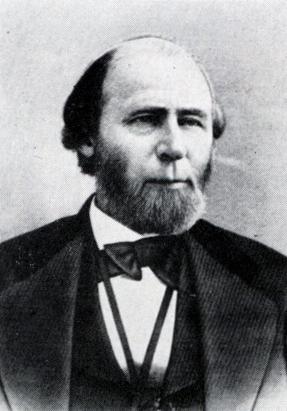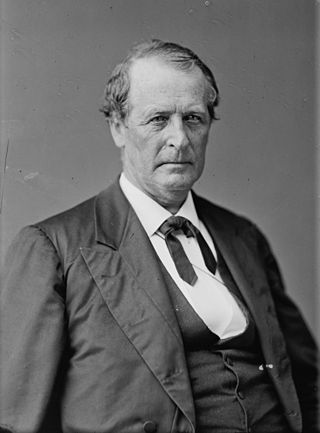Related Research Articles

Locke Craig, an American lawyer and Democratic politician, was the 53rd governor of the U.S. state of North Carolina, serving from 1913 until 1917.

William Woods Holden was an American politician who served as the 38th and 40th governor of North Carolina. He was appointed by President Andrew Johnson in 1865 for a brief term and then elected in 1868. He served until 1871 and was the leader of the state's Republican Party during the Reconstruction Era.

Furnifold McLendel Simmons was an American politician who served as a Democratic member of the United States House of Representatives from March 4, 1887, to March 4, 1889, and U.S. senator from the state of North Carolina between March 4, 1901, and March 4, 1931. He served as chairman of the powerful Committee on Finance from March 4, 1913, to March 4, 1919. He was an unsuccessful contender for the 1920 Democratic Party nomination for president. Simmons was a staunch segregationist and white supremacist, and a leading perpetrator of the Wilmington insurrection of 1898.

Jeter Connelly Pritchard was a lawyer, newspaperman, United States Senator and a United States circuit judge of the United States Court of Appeals for the Fourth Circuit and of the United States Circuit Courts for the Fourth Circuit and previously was an associate justice of the Supreme Court of the District of Columbia. Earlier in his political career he served in the North Carolina House of Representatives. He was a Republican who was part of the populist fusion political wave before later opposing civil rights for African Americans.

Thomas Samuel Ashe was an American lawyer and politician who served in the Confederate Congress, and U.S. Congressman from North Carolina.

The 55th United States Congress was a meeting of the legislative branch of the United States federal government, composed of the United States Senate and the United States House of Representatives. It met in Washington, D.C., from March 4, 1897, to March 4, 1899, during the first two years of William McKinley's presidency. The apportionment of seats in the House of Representatives was based on the 1890 United States census. Both chambers had a Republican majority. There was one African-American member, George Henry White, a Republican from the state of North Carolina, and one Kaw member, Charles Curtis, a Republican from Kansas.
More than 1,500 African American officeholders served during the Reconstruction era (1865–1877) and in the years after Reconstruction before white supremacy, disenfranchisement, and the Democratic Party fully reasserted control in Southern states. Historian Canter Brown Jr. noted that in some states, such as Florida, the highest number of African Americans were elected or appointed to offices after the end of Reconstruction in 1877. The following is a partial list of notable African American officeholders from the end of the Civil War until before 1900. Dates listed are the year that a term states or the range of years served if multiple terms.

The North Carolina Democratic Party (NCDP) is the North Carolina affiliate of the Democratic Party. It is headquartered in the historic Goodwin House, located in Raleigh.

The president pro tempore of the North Carolina Senate is the highest-ranking officer of one house of the North Carolina General Assembly. The president of the Senate is the Lieutenant Governor of North Carolina, but the president pro tempore actually holds most of the power and presides in the absence of the Lt. Governor. The president pro tempore, a senior member of the party with a majority of seats, appoints senators to committees and also appoints certain members of state boards and commissions. From 1777 to 1868, North Carolina had no Lieutenant Governor, and the highest-ranking officer of the Senate was known as the "Speaker". The Speaker of the Senate was next in line if the office of Governor became vacant. This occurred on two occasions.

The speaker of the North Carolina House of Representatives is the presiding officer of one of the houses of the North Carolina General Assembly. The speaker is elected by the members of the house when they first convene for their regular session, which is currently in January of each odd-numbered year. Perhaps the most important duty of the speaker is to appoint members and chairs of the various standing committees of the House.

Cyrus Thompson was a politician and leader of the Populist Party in North Carolina. He served as North Carolina Secretary of State for one term, from 1897 to 1901.

Charles Albert Reynolds was a civil engineer and North Carolina Republican politician who served as the eighth Lieutenant Governor of North Carolina from 1897 to 1901 under Governor Daniel L. Russell. Limited to one term in office by the state constitution of the time, Reynolds later ran unsuccessfully for the U.S. House of Representatives from North Carolina's 5th congressional district in 1904 and 1906. He is buried in the churchyard of the Episcopal Church of the Epiphany in Eden, North Carolina.

James Hunter Young was an American soldier and politician from North Carolina. He was a colonel in the Third North Carolina Regiment during the Spanish–American War and served in the North Carolina House of Representatives. He was a Republican.
The following table indicates the party of elected officials in the U.S. state of North Carolina:

Hamilton Glover Ewart was a United States representative from North Carolina and a United States district judge of the United States District Court for the Western District of North Carolina.

The 1896–97 United States Senate elections were held on various dates in various states. As these U.S. Senate elections were prior to the ratification of the Seventeenth Amendment in 1913, senators were chosen by state legislatures. Senators were elected over a wide range of time throughout 1896 and 1897, and a seat may have been filled months late or remained vacant due to legislative deadlock. In these elections, terms were up for the senators in Class 3.

The North Carolina General Assembly of 1860–1861 met in Raleigh, North Carolina in regular session from November 19, 1860, to February 25, 1861. They met in extra sessions from May 1, 1861, to May 13, 1861, and from August 15, 1861, to September 23, 1861. This General Assembly decided that each county should vote for special delegates who would decide whether North Carolina should secede from the Union. On May 20, 1861, those special delegates convened in Raleigh and voted unanimously that the state would no longer be a part of the United States of America.
The North Carolina General Assembly of 1835 met in Raleigh from November 16, 1835 to December 22, 1835. The assembly consisted of the 137 members of the North Carolina House of Commons and 65 senators of North Carolina Senate elected by the voters in August 1835. This was the last assembly elected before the amendments to the Constitution of North Carolina from the North Carolina Constitutional Convention of 1835 took effect. Thus, the House of Commons included representatives from towns and the number of members of the house was greater than 120. William H. Haywood, Jr was elected speaker of the House of Commons and Charles Manley was elected clerk. William D. Mosely was elected President of the Senate and William J. Cowan was elected Clerk. Richard Dobbs Spaight, Jr. was elected the Governor by the assembly and served from December 10, 1835 to December 31, 1836. He was the last governor of North Carolina to be elected by the General Assembly.

The North Carolina General Assembly of 1868–1869 met in Raleigh from November 16, 1868, to April 12, 1869, with a special session from July 1, 1868, to August 24, 1868. This was the first assembly to meet after the approval of the new Constitution of North Carolina in 1868. As prescribed in this constitution, the assembly consisted of the 120 members in the North Carolina House of Representatives and 43 senators in the North Carolina Senate elected by the voters on August 6, 1868. This assembly was in control of the Republican Party and was dominated by reconstruction era politics.

James Marion Mewborne was an American farmer and politician who served as North Carolina Commissioner of Agriculture from 1897 to 1898.
References
- ↑ Trelease, Allen W. (1980). "The Fusion Legislatures of 1895 and 1897: A Roll-Call Analysis of the North Carolina House of Representatives". The North Carolina Historical Review. 57 (3): 307. JSTOR 23535481.
- 1 2 3 "Henderson, William B. | NCpedia". www.ncpedia.org.
- ↑ "North Carolina State Senate - 1897". www.carolana.com.